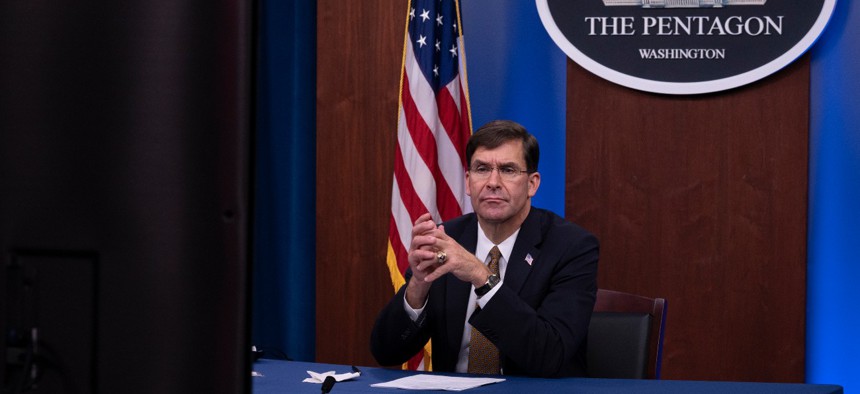
Then-Secretary of Defense Mark Esper conducts Virtual Engagement with Industry Partners at the Pentagon on Oct. 21. Marvin Lynchard / Defense Department
Viewpoint: The Danger of Treating National Security Like a Political Sideshow
Monday was a dangerous day.
What will it take for Americans to start taking national security seriously again?
Much of America’s national security establishment has condemned, opposed, or resisted President Donald Trump in one form or another. By Election Day, hundreds of them, active and retired, were pleading with the American people not to reelect Trump for a long list of reasons, from his erratic troop withdrawals to his attacks on NATO allies and his support for racist Confederate symbols — in short, a person too feckless to be entrusted with the nation’s defense.
On Monday, President Donald Trump gave the nation a new reason for serious concern when he fired Mark Esper, his fourth defense secretary in four years. With virtually nobody in the Republican national security world still willing to serve him, Trump tapped a little-known Pentagon civilian about four notches below the SecDef’s office. Chris Miller will sit atop the chain of command for the entire U.S. military, just under the commander in chief, nuclear weapons and all.
In any other time, with any other president, Senate Republicans — hell, anyone in the Senate or GOP — would be howling and doing everything in their power to block this move. No offense to Acting Defense Secretary Miller but — who? Miller, as of today, has legal control of the Pentagon and everything that comes with it, from nuclear weapons to troop movements, secret hunt-and-kill missions, pending billion-dollar contracts, sensitive weapons developments, relationships with key allies, and, oh yes, those Confederate base names. Miller, a retired Army officer, has civilian government leadership experience of all of two years. He’s not a total rookie, having served as civilian leader for special operations and as director of the National Counterterrorism Center. But the leap to the SecDef’s E-ring office is Olympic record-breaking.
In four years, all of Trump's defense secretaries have gone down in flames. Jim Mattis, a revered general with no prior political or civilian experience, quit because he opposed Trump’s isolationist tendencies and had enough. Pat Shanahan, a Boeing executive with no prior government experience, resigned his acting post amid scandal. Richard Spencer, investment banker-turned-acting secretary for a few weeks, was later fired as Navy secretary for opposing Trump. Esper, today, fired.
By comparison, two-term President Barack Obama appointed Robert Gates, a Republican holdover from the George W. Bush administration during wartime with a lifetime of global security experience as head of CIA and deputy national security advisor; Leon Panetta, CIA director during the Osama bin Laden raid, White House chief of staff, and Congressman; Chuck Hagel, a longtime Republican U.S. senator and Vietnam vet who mentored then-Senator Obama on foreign policy; and Ash Carter, who ascended after serving as the Pentagon’s No. 2 and an entire career in and out of the Defense Department.
The United States military, intelligence, and law enforcement establishment has done its best to survive the Trump era with its dignity and credibility intact. Luckily, Trump’s own conspiracy-laden attacks on the Defense Department, CIA, and FBI have helped to paint those agencies (to anyone other than Trump’s most fawning base) as enemies to his power grabs and as stalwart security agencies on which U.S. allies can still rely. At the Pentagon, Trump’s succession of replacements mostly have tried to keep the military “apolitical” — meaning, they’ve tried to keep the military from being harmed by this president’s constant attempts to usurp it — with varying degrees of success. Ultimately, Mattis, Shanahan, Spencer, and Esper all failed. With barely 70 days left in his office, Chris Miller will now have legal control of the world’s most lethal fighting force, at a moment in history when China’s Xi Jinping and Russia’s Vladimir Putin are doing all they can to find and exploit cracks in America’s armor.
This is a dangerous day. The Joint Chiefs of Staff were unprepared for it, CNN’s Barbara Starr reported; they called an emergency meeting with the combatant commanders who govern U.S. troops worldwide. The service secretaries of the Army, Navy, and Air Force were “blindsided,” reported Fox News producer Lucas Tomlinson. So were Senate and House Armed Service Committee leaders, according to several journalists on Capitol Hill.
Americans should want better than this. For an entire 2020 presidential campaign, voters and media evinced alarmingly minimal interest in debate or discourse about anything beyond their borders. While Americans fought their culture and partisan wars; fought over how to treat immigrants, women, minorities, and each other; fought over the coronavirus pandemic and the economy; fought over patriotism and flags; and fought over truth and lies, the national security community tried, and largely failed, to draw public attention to threats lurking abroad. Would, or should, Americans even want to lead the world again?
Trump’s lame-duck firings may just be beginning. Reportedly, he has FBI Director Chris Wray and CIA Director Gina Haspel also in his sights. Why? Because they, too, have failed to swear loyalty to Trump instead of to the country, its Constitution, and its national security. If the still-president follows through with these firings, then he might finally install atop the Pentagon, CIA and FBI — the foundational institutions of U.S. national security — Trump loyalists who could turn them into the personal security services he’s always envisioned them to be.
Inauguration Day is 71 days away. That possibility should be enough to make even Senate Republicans care, even if Americans won’t.







